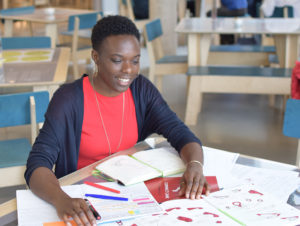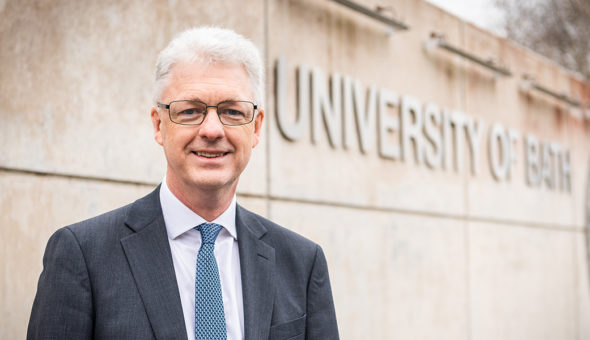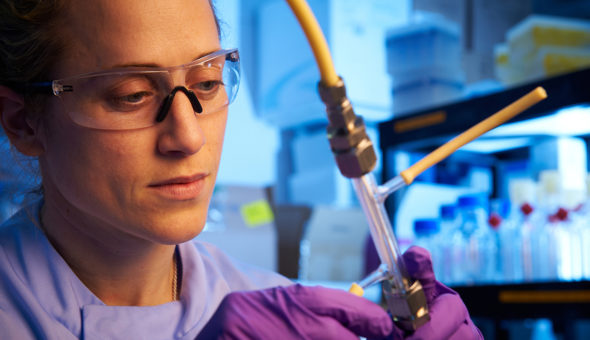Nia Simpson grew up watching The Apprentice because her dad once worked for Lord Sugar at Amstrad. 2011’s winner Tom Pellereau stood out to her “because he was an engineer but had business acumen. Reading up on him, I found out he went to Bath. I saw the degree he did and thought, ‘wow, that’s really cool, maybe I could do that as well?’ He was one of the biggest reasons why I came here.”
Before he invented the Stylfile, Tom studied Innovation & Engineering Design at Bath, graduating in 2002. We ask Nia what happened when they were introduced at an alumni event. “To be honest, I felt quite uncomfortable,” she recalls. Thankfully, their encounter wasn’t one of those awkward occasions which fulfil the saying you should never meet your heroes.
“He told me that when he was on The Apprentice, Lord Sugar changed his mindset to ‘if you have the idea, what can you do now so you can start making money tomorrow?’” Nia explains. “It was cool for him to say that, even though it was an uncomfortable thing for me to hear. It challenged me completely. I could tell that he was really passionate about what he did, and he had a lot of experience.”
Nia’s own invention came from her final year project studying the same course as Tom. “I’m passionate about user-centred design and I really wanted to use that to figure out how I could create a meaningful product,” she says. Compact Cane is the first discreet digital white cane for people with visual impairments.
Nia undertook market research with visually impaired students on campus in order to develop her prototype. During one session, a student told Nia that she had a job interview, but wasn’t going to take her white cane with her because she was concerned she would be treated differently to other candidates, even discriminated against.
“It was in that moment that I realised, this sucks!” Nia recalls. “The traditional white cane can give you some benefits but in other ways it can really hinder you. My heart starting pumping. If this was me, I’d want a solution, I’d want something to help me. So I was, like, ‘let’s do something about it!’”

Compact Cane, which uses invisible ultrasonic waves to detect obstacles in real-time, has now won Nia a coveted £15,000 Innovation Award donated by graduate His Excellency Khalil Foulathi (BSc Economics 1975, Hon LLD 2011). It’s a 12-month investment to enable her to undertake further research and development and turn her invention into a business.
A growing number of Bath graduates benefit from the same opportunity. Thanks to alumni support, fellow Innovation Award-winners are developing business ideas as diverse as electrifying bicycles, converting human waste into cooking fuel and recycling flowers discarded at Indian temples.
Computer Sciences graduate Ashton Clapp (2016) has even gone so far as to build a thriving tech business right here in Bath, employing nine people including other Bath graduates. He describes receiving his Award as like having someone plant a seed.
An Innovation Award doesn’t come out of the blue, however. Hundreds of talented students take part in a pipeline of corporate partner and alumni-backed activities and competitions every year – from Dragons’ Den to Apps Crunch to joining student societies like Bath Entrepreneurs – which they manage to squeeze in around their studies. The very best compete to receive an Innovation Award once they graduate.
One advantage the Innovation Award brings is membership of SetSquared, the world's number one university-based business incubator, which is located at the University’s Innovation Centre in town. The SetSquared team helps Nia develop practical skills such as financial modelling, and unlocks access to advisers in the local business community who, like Tom Pellereau, aren’t afraid to put her on the spot.
“I value people who say ‘this is a really good idea but let me challenge you on a few things’,” she says. “That really stretches me. I definitely need people who are, like, ‘there are some holes in this, let me help you’.”
Creating environments that set challenges, connect different perspectives, provide safe spaces for experimentation and help people share their knowledge and experience is what the University aims to create in its new Entrepreneurship Lab, part of the School of Management building which will open in 2021.
The Lab will make it easier for new graduates to work together to develop their business ideas, whatever subject they’ve studied. They’ll have the benefit of mentoring and coaching from academics and experienced entrepreneurs, in harmony with the SetSquared incubation network, the Students’ Union enterprise programmes, and research expertise from academics in the School itself.
Nia acknowledges she’s been fortunate to grow up in a family which is supportive of enterprise, and study a subject that has stretched her, at a university that has encouraged her to innovate. But it’s the confidence that her Innovation Award has sparked within her which really shines through.
“It has completely rocked my world, changed my life,” she says. “I had no idea I was going to do something like this, but this is what I should be doing. The fact that someone believed in an idea and was able to give money, you don’t realise how much impact that has made in terms of the trajectory of my life.”
When asked how she's changed in the past six months, Nia says: “I’m very aware of what I’m good at now and I think I’m a lot more OK with uncertainty, I’m not as worried about it.”
At the time of writing, Nia had been chosen to represent the University in the first stage of the Santander Entrepreneurship Awards, a competition open to all of Santander’s 83 UK university partners. Nia made it to the semi-finals and although it wasn’t the Lord Sugar moment she had been hoping for, she’s even more ready for the next opportunity.
“The experience built my confidence in pitching and I got great feedback and connections,” Nia tells us. “Now I’m working to get myself in front of the right people who can help fund or accelerate the company.” We wish her and Compact Cane the best of luck.
Respond



